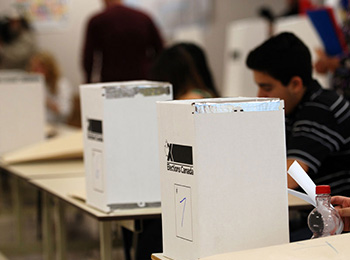While candidates are busy crafting their playbooks for the next federal election, there’s a warning that the scheduled date of the vote – Oct. 21, 2019 – falls on a major Jewish holiday, thus potentially preventing observant Jews from casting ballots.
In a letter to Stéphane Perrault, the chief electoral officer of Canada, the Centre for Israel and Jewish Affairs (CIJA) pointed out that the scheduled date coincides with Shemini Atzeret, when many activities, including work and travel, are prohibited.
“Consequently, observant Jews will not avail themselves of the right to vote on that day,” CIJA’s CEO, Shimon Koffler Fogel, wrote in the Aug. 22 letter to Perrault.
CIJA stressed that it is not asking for the date of the election be changed, but “we request that your office give special consideration to this situation. Protecting Canadians’ effective right to vote is a core mandate of your office, and we want to ensure that Canadian Jews’ right to vote is included.”
The group said it did not know when advance polls will take place, “but some of those days may also fall on other important Jewish Holy Days.” It provided a list of those days for 2019.
CIJA also provided a list of ridings with significant Jewish populations, “so that specific actions can be undertaken to accommodate those voters’ needs.”
READ: ANTHONY HOUSEFATHER ACCLAIMED BY MOUNT ROYAL LIBERALS
The next federal election is scheduled to take place on Oct. 21, 2019, according to the fixed election date provisions in the Canada Elections Act.
The act states that a general election “must be held” on the third Monday in October in the fourth calendar year following the last general election.
However, the law says the chief electoral officer may choose another day, if the fixed date is “not suitable” because it’s “in conflict with a day of cultural or religious significance.”
The alternate must be either the next day, which is Simchat Torah, when almost all work is also forbidden, or the following Monday, Oct. 28.
Elections Canada is “aware” of the issue, spokesperson Ghislain Desjardins told The CJN.
“While we don’t have control over the election dates, we routinely adjust our operations – such as locations, community engagement, recruitment, voter information – for religious holidays.”
 As in the past, “We work with all groups to raise awareness of the best voting options to meet their needs, and we will continue to do so,” Desjardins said.
As in the past, “We work with all groups to raise awareness of the best voting options to meet their needs, and we will continue to do so,” Desjardins said.
He said there will be more advance polls next year, to accommodate “as many people as possible.”
This would not be the first time voting has coincided with a Jewish holiday. The federal election in 2008, which returned former prime minister Stephen Harper to office, clashed with the first day of Sukkot.
According to a report from the chief electoral officer that came out following that election, B’nai Brith Canada “gave assurances that the Jewish community would not feel slighted. Nevertheless, the coincidence of dates could have prevented some electors from voting.”
Elections Canada worked with the now-defunct Canadian Jewish Congress to provide information about casting ballots before the Oct. 14 vote. “Together, the congress and Elections Canada reached out to the Jewish population,” the report stated. “On Oct. 3, the Conservative party notified a returning officer of the expected heavy turnout for advance polls in certain locations. On Oct. 5, the Canadian Jewish Congress informed Elections Canada that advance voting turnout had been heavy as expected in the electoral district of Thornhill and that there had been some long lineups. The Canadian Jewish Political Affairs Committee also wrote to several returning officers in the Toronto, Montreal and Edmonton areas, informing them that it would invite Jewish electors to vote at the advance polls held on Monday, Oct. 6.”
With help from “an interested community,” Elections Canada was able to provide additional workers at advance polls in the electoral districts concerned, according to the report.
Returning officers reported high turnouts at advance polls in the ridings of Thornhill, York Centre, Eglinton–Lawrence and Mount Royal – “well above the average reported for advance polling across the country,” the report stated.
In 2002, observant Jews were precluded from choosing a new leader for Ontario’s Progressive Conservative party, which was popular at the time for its policy of extending tax relief to parents of children in private schools, because the election took place on a Saturday. Proxy voting was ruled out after rabbis said that Jewish law prohibits a third party from performing a task that is forbidden to Jews.
In 1978, there was much consternation in Jewish circles when 15 federal byelections were held on the first day of Sukkot.
Observant Jews will not avail themselves of the right to vote on that day.
– Shimon Koffler Fogel
One may not vote on Shemini Atzeret, but “one should make every effort to exercise this democratic right at one of the advance polls, or at the returning office,” Rabbi Asher Vale, the director of Toronto’s Beis Din and Vaad Harabonim, told The CJN.
Shemini Atzeret is sometimes considered a separate holiday and sometimes as the last day of Sukkot. Both that day and Simchat Torah are marked by nightly candlelighting, festive meals and desisting from work. They conclude the High Holiday period.
Yizkor, the memorial prayer for the dead, is said on Shemini Atzeret. As well, prayers for rain are recited to help with the following spring’s harvest.









